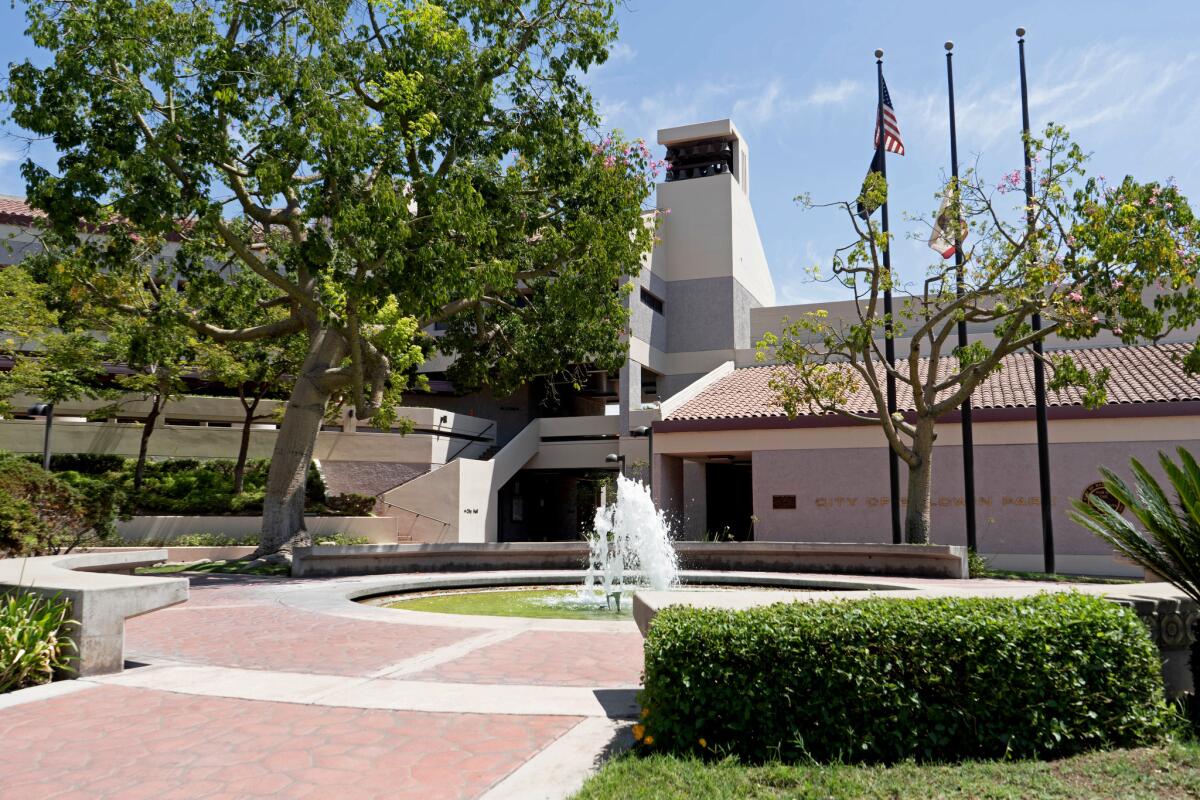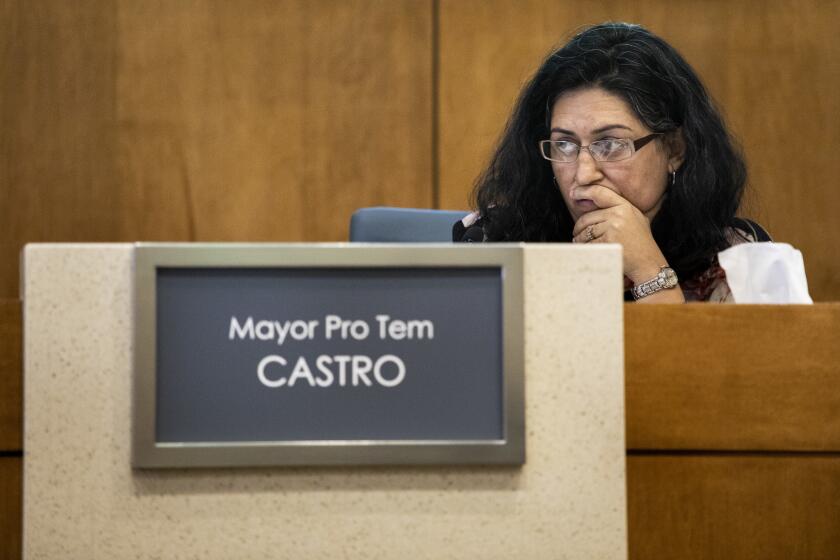FBI raids on local officials mark latest probe targeting corruption in cannabis licensing

- Share via
Since California voters legalized recreational cannabis four years ago, allegations of conflicts of interest, bribery and bias in the permitting process have plagued cities and counties as they try to regulate the fledgling industry.
The accusations have led to a series of high-profile arrests and prosecutions of local government officials and pot operators.
The latest law enforcement investigation involving cannabis licensing emerged in recent days after FBI agents served warrants at the home of a Compton councilman, the downtown L.A. law offices of the Baldwin Park city attorney and the home of a San Bernardino planning commissioner.
FBI agents searched the properties as part of an investigation into how Baldwin Park has been dealing with cannabis businesses, according to sources familiar with the inquiry.
It’s not clear what exactly federal agents are investigating or whether the three local government officials are targets. An FBI spokeswoman confirmed their addresses were among those searched Oct. 28 and said the three men were not arrested.
Compton Councilman Isaac Galvan confirmed that FBI agents searched his apartment. He said the investigation had no connection to Compton city government but would not say whether he has cannabis business interests in Baldwin Park. He referred other questions to his attorney, who did not respond to multiple phone calls and emails.
A lawyer representing Baldwin Park City Atty. Robert Tafoya said in an emailed statement that his client “is proud of his many years of distinguished service as city attorney of Baldwin Park” and that it would be inappropriate to “address the specifics of the federal investigation at this time.”
Attorney Mark Werksman also said Tafoya “shares the federal government’s interest in rooting out corruption in the cannabis industry and prosecuting political corruption of any kind.
“There is no place for that in our community,” he said in the statement. (Werksman has represented Times journalists in unrelated matters.)
Gabriel Chavez, the San Bernardino County planning commissioner, did not return phone calls and messages for comment.
In an interview with the San Gabriel Valley Tribune, Chavez said FBI agents searched his home while he wasn’t there and seized his laptop computer. He learned they also wanted his cellphone and drove to the FBI’s West Covina office to turn it over, he told the newspaper. He said he wasn’t “clear as to what’s going on.”
The raids come amid controversy over Baldwin Park’s approval of licenses for cultivation, distribution, manufacturing and testing of cannabis.
In September, a former Baldwin Park police officer said in a sworn declaration that he had received complaints from three cannabis operations alleging “questionable business practices, which included paying as much as $250,000 cash in a brown paper bag to city officials.”
The declaration, signed by a retired police lieutenant who had helped oversee regulating cannabis businesses in the city, was filed in defense of a former police chief the city accused of unrelated wrongdoing. The declaration’s allegations about cannabis businesses do not mention Tafoya, Galvan or Chavez.
One of the sources familiar with the FBI investigation, who is not authorized to discuss an ongoing inquiry publicly and requested anonymity, said federal agents have been interviewing people about allegations that Baldwin Park officials requested illegal payments from cannabis businesses seeking permits in the city.
Such allegations have become familiar in cities that allow cannabis businesses. Bribery charges have been filed in at least half a dozen counties in recent years, including Alameda, San Bernardino, Humboldt and Siskiyou counties.
In Adelanto, Mayor Pro Tem Jermaine Wright was charged in 2017 with agreeing to accept a bribe from an undercover FBI agent masquerading as a businessman who wanted to move his cannabis cultivation operation into the city. Wright has pleaded not guilty.
A Kern County supervisor was charged in 2018 with a misdemeanor crime for allegedly casting a pro-cannabis vote while her husband had financial ties to the industry. The supervisor was the only official on the panel to vote against prohibiting cannabis sales in the county. The Kern County district attorney’s office agreed this year to dismiss the charges in exchange for Supervisor Leticia Perez admitting to the allegations, paying thousands of dollars in fines and performing community service.
A combination of factors has made the industry vulnerable to corruption.
California voters legalized the possession and sale of recreational cannabis in 2016 but left it up to cities and counties to decide whether they would allow businesses in their jurisdictions to cultivate, manufacture, distribute or sell cannabis products.
Most cities still prohibit cannabis businesses from operating within their borders, and those that do allow pot operations typically place strict limits on the number of licenses they issue as well as their locations. With permits limited, it is speculated that they could be worth millions of dollars, and competition for them can be fierce.
Cannabis businesses are also cash-intensive. Because the drug is still illegal under federal law, the companies are forced to deal mainly in cash.
Baldwin Park officials continued the city’s ban on retail sales of cannabis but decided to allow local manufacturing, distribution and laboratory testing of the drug. City officials began awarding licenses in late 2017 and have said the maximum number of permits they’ll allow is 25.
Few local politicians have championed marijuana as loudly as Aide Castro.
The city’s approval process erupted in controversy in 2017 after the council granted one business, Rukli Inc., an exclusive permit to distribute cannabis produced in the city. The arrangement prompted a resident and a cannabis business to challenge the contract in court, alleging that the city was giving Rukli a monopoly over distribution and asking a judge to set aside the contract’s exclusivity provisions. A judge denied their request.
Nearly a week after the FBI raids, the city of Baldwin Park issued a statement saying it had not been contacted by federal agents and noting that Tafoya is not an employee but works for the city on a contract.
“Baldwin Park’s officials recognize the need to continue to be transparent and to maintain public confidence; the city will cooperate fully with federal authorities if necessary,” the statement said.
In an interview with The Times, Baldwin Park Mayor Manuel Lozano defended how the city has handled cannabis regulation and said he knew of no wrongdoing. Galvan has raised campaign funds for Lozano, he said, and that fundraising was legal.
“Everything that’s done in the city of Baldwin Park, including by me, is aboveboard,” said Lozano, who last week lost his bid for reelection.
Baldwin Park City Councilwoman Monica Garcia said she was surprised to learn about the FBI’s search of the city attorney’s office and had never witnessed anything improper by Tafoya.
“He’s been an effective city attorney for us for seven years,” she said. “I would just say let the authorities investigate and let justice prevail.”
More to Read
Sign up for Essential California
The most important California stories and recommendations in your inbox every morning.
You may occasionally receive promotional content from the Los Angeles Times.
















